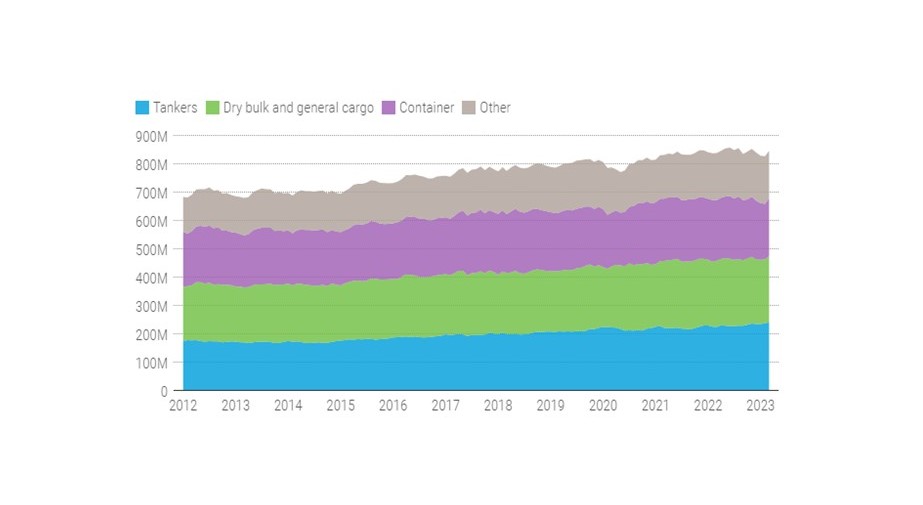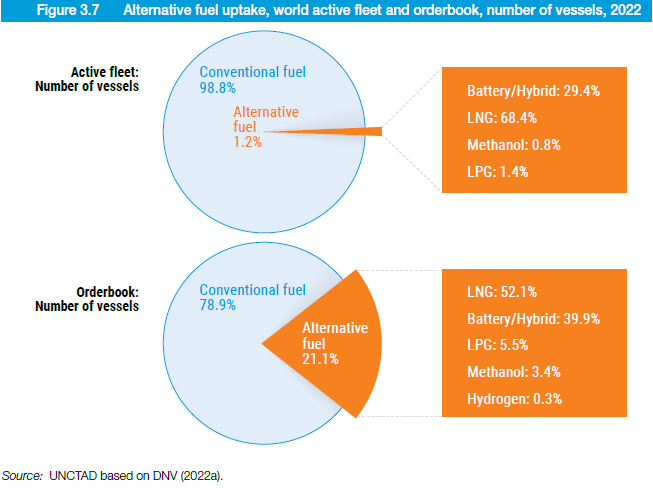The United Nations Conference on Trade and Development (UNCTAD) in their Review of Maritime Transport 2023 report highlights the pressing need for cleaner fuels, digital solutions and an equitable transition to combat continued carbon emissions and regulatory uncertainty in the shipping industry.
Cleaner fuels
UNCTAD, ahead of the United Nations climate conference (COP28) in November of this year, advocates for a shift towards cleaner fuels in shipping, emphasizing the need for an environmentally effective, procedurally fair, socially just, technologically inclusive and globally equitable transition strategy.
The organization also underscores the importance of system-wide collaboration, swift regulatory interventions, and robust investments in green technologies and fleets.
The transition to alternative fuels is still in its infancy. A total of 98.8 per cent of the global fleet in terms of number of vessels use conventional fuels. Only 1.2 per cent are using alternative fuels, mainly liquified natural gas (LNG), and to a lesser extent, battery/hybrid, liquified petroleum gas (LPG), and methanol.
Maritime transport needs to decarbonize as soon as possible, while ensuring economic growth. Balancing environmental sustainability, regulatory compliance and economic demands is vital for a prosperous, equitable and resilient future for maritime transport.
… said UNCTAD Secretary-General, Rebeca Grynspan
Technological readiness, scalability, and regulatory certainty are required to firm up demand for alternative fuels and vessels, the report adds.
Just and equitable transition
However, the transition comes with substantial costs. UNCTAD reports that an additional $8 billion to $28 billion will be required annually to decarbonize ships by 2050, and even more substantial investments, ranging from $28 billion to $90 billion annually, will be needed to develop infrastructure for 100% carbon-neutral fuels by 2050.
Full decarbonization could elevate annual fuel expenses by 70% to 100%, potentially affecting small island developing states (SIDS) and least developed countries (LDCs) that heavily rely on maritime transport.
To ensure an equitable transition, UNCTAD calls for a universal regulatory framework applicable to all ships, irrespective of their registration flags, ownership or operational areas, thereby avoiding a two-speed decarbonization process and maintaining a level playing field.
Economic incentives, such as levies or contributions paid in relation to shipping emissions may incentivize action, can promote the competitiveness of alternative fuels and narrow the cost gap with conventional heavy fuels.
… said Shamika N. Sirimanne, UNCTAD’s director of technology and logistics, adding that these funds could also facilitate investments in ports in SIDS and LDCs, focusing on climate change adaptation, trade and transport reforms, as well as digital connectivity.
Digitalization
In addition to cleaner fuels, UNCTAD underscores the role of digitalization in accelerating decarbonization efforts, citing the benefits in enhancing efficiency and reducing delays.
Investing in digitalization and technology will improve predictability and reliability of shipping, and applying technologies such as AI, machine learning, blockchain and the internet of things will result in performance optimization for monitoring, routing, speed and predictive maintenance
… said Ms. Sirimanne said.
Despite the potential for technological advances and innovation to help maritime transport curb emissions, it should be emphasized that leveraging technology should also adopt a full life cycle perspective and prevent carbon leakage, the report highlights.
Furthermore, the report focuses on the recent boom in the use of AI has raised concerns over the emission impact of the servers that power AI. As the report notes, one estimate suggests that AI language models and data centres are estimated to account for 1 per cent of global carbon emissions (Biggs, 2023). Another estimate expects that by 2040, server farms may account for 14 per cent of global carbon emissions (Auslender and Ashkenazi, 2023).
Ageing global fleet
UNCTAD further expresses concern over the ageing global shipping fleet – at the start of 2023, commercial ships were on average 22.2 years old, two years older than a decade ago. More than half of the world’s fleet is over 15 years old.
Ship owners face the challenge of renewing the fleet without clarity regarding alternative fuels, green technology and regulatory regimes to guide ship owners and ports, while port terminals face similar challenges in vital investment decisions.

Policy recommendations
To accelerate the energy transition in shipping and achieve the GHG emission targets of IMO, robust collaboration is required among all stakeholders. These include Governments, policy makers, shipping and ports, as well as energy suppliers and lending institutions, among others. As a result, the report suggests the following key actions:
#1 Facilitate the fuel transition, enable a level playing field
- Develop regulations and set clear targets for the use of zero and near-zero GHG fuels in the shipping industry. Encourage carriers to adopt the associated energy sources, vessels, operational practices, and technologies.
- Support research, development and deployment initiatives promoting innovative and sustainable technologies for shipping.
- Prepare for shipping fleets that simultaneously run on more than one fuel type and promote optionality through dual-fuel and tri-fuel designs.
- Gather the low hanging fruit by leveraging technologies in shipping that improve operational efficiency, fuel saving and energy efficiency and promote digital solutions that accelerate shipping decarbonization.
- Build partnerships between Governments, academia, and industry stakeholders to foster knowledge sharing and collaboration.
- Promote sustainable facilities at ports, clean energy marine hubs and green shipping corridors that are more geographically, vessel and commodity inclusive.
- Ensure stakeholders in seaports collaborate widely across the port ecosystem with fuel suppliers to ensure a sufficient supply of alternative low and zero GHG fuels and infrastructure for distribution.
- Assess the readiness of the alternative fuels and vessel designs, the sustainability and scalability of potential solutions and their regulatory and safety maturity levels.
- Governments, academia, and public- and private-sector organizations should analyse the upstream footprint of alternative fuel production for shipping, including the GHG life cycle of the different fuels, as well as their full potential and production limits (e.g., biofuels).
- Ensure that international rules enable a level playing field and promote measures to lower the cost or price gap between alternative and conventional marine fuels.
- Create certainty regarding the volume of low and zero carbon fuels and energy that will be needed at different points in time, through technical measures such as a fuel standard.
- Consider economic measures such as a levy that acts as a price for carbon to support the energy transition and incentivise investment in alternative fuels and green technologies for ships. Monitor impacts of the energy transition and decarbonization in shipping on costs, trade, and economic output.
- Monitor alternative fuel prices to help generate data for assessing the economic implications of decarbonization efforts. This information can guide decision-making processes, inform regulatory efforts, and boost sustainable, fair, and transparent shipping practices.
- Establish an advisory mechanism to guide the setting of freight rates and fuel surcharges. Communicate and monitor trends in freight costs and fuel surcharges. The advisory mechanism should bring together shipping, trade and relevant stakeholders in the maritime supply chain, including government and regulatory bodies.
#2 Align the regulatory framework in shipping with internationally agreed goals
- Targets for usage of low and zero carbon fuels in the shipping industry are needed to ensure progress on global climate mitigation objectives set out in the Paris Agreement.
- A strong regulatory framework for shipping to reduce GHG emissions and protect the environment should align with the 2030 Agenda for Sustainable Development.
- Support fleet renewal and avoid a capacity crunch in shipping.
- National and international regulations should minimize uncertainty, which prevents shipowners’ timely investment in a new and modern fleet that runs on low or zero carbon fuels and which delays the introduction of onboard and onshore energy saving and green technologies.
- Monitor trends in ship finance for both fleet renewal and green investment and scale up ship financing and investment levels.
- Monitor trends in shipbuilding capacity to ensure a timely energy transition for shipping decarbonization.
- Ensure that crews are adequately trained in the use of alternative fuels and related shipboard systems.
#3 Support developing countries particularly small island developing States and the least developed countries, during the transition
- Continue to assess the impacts of the decarbonization of international shipping on the most vulnerable economies, who already pay higher shipping costs and depend heavily on maritime transport for their trade, consumption needs and economic development.
- Provide technical and financial support to countries where maritime logistics costs increase due to shipping decarbonization. Support could include investing in port infrastructure and services, implementing trade facilitation measures, and taking up ship and port technologies and digital tools, as well as providing capacity-building for national maritime, port and competition authorities.
- Provide support to developing countries grappling with higher maritime logistics costs. The economic component of the proposed IMO midterm measures such as levies on bunker fuels or carbon could generate funds to scale up decarbonization efforts.































































